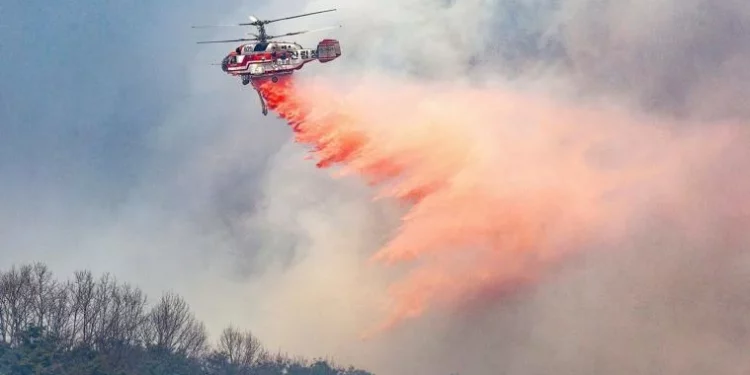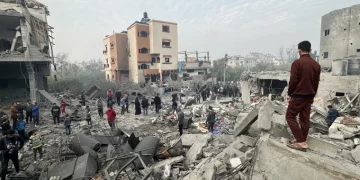Seoul: The death toll from wildfires ravaging southern regions of South Korea rose to 24, officials said Wednesday.
The National Fire Agency says 26 other people have sustained varying degrees of injuries.
South Korean officials earlier Tuesday said that firefighters had extinguished most of the flames from the largest wildfires in those areas, but the ongoing dry and windy weather caused setbacks and allowed the blazes to spread again.
Nearly 9,000 firefighters, along with more than 130 helicopters and hundreds of vehicles, were deployed to battle the fires, but efforts were partially suspended overnight as the winds strengthened.
Officials in Andong and Uiseong county ordered residents in several villages and those near Andong University to evacuate to safe locations or temporary shelters — including schools and indoor gyms — as a fire that started in Uiseong continued to spread due to strong winds.
The blaze in Uiseong destroyed Gounsa, a Buddhist temple built in the 7th century, according to officials from the Korea Heritage Service.
There were no immediate reports of injuries, and some of the temple’s national treasures, including a stone Buddha statue, were evacuated before the fire reached the wooden buildings.
The fire also spread to the nearby coastal town of Yeongdeok, where officials shut down roads and ordered residents of at least four villages to evacuate.
The justice ministry did not immediately confirm local reports that it had begun relocating some 2,600 inmates from a prison in Cheongsong county, also near Uiseong.
The Korea Forest Service said firefighters were fighting at least five active wildfires nationwide as of Wednesday morning.
The service had raised its wildfire warning to the highest “serious” level nationwide Tuesday, requiring local governments to allocate a larger workforce for emergency response, tighten entry restrictions for forests and parks, and recommend that military units withhold live-fire exercises.
Four firefighters and government workers were killed in Sancheong Saturday after being trapped by fast-moving flames driven by strong winds.
Prime Minister Han Duck-soo, serving as the country’s acting leader following President Yoon Suk Yeol’s impeachment over a December martial law decree, has vowed an all-out effort to contain the wildfires and also urged public vigilance as dry spring weather persists.
Government officials said they suspect that several of the recent wildfires, including those in Uiseong and Ulsan, were caused by human error, possibly due to the use of fire while clearing overgrown grass in family tombs or sparks from welding work.
AP







































